Unsung Heroes of New England
With the “Unsung Hero” award, the New England Jazz Hall of Fame recognizes a group of jazz advocates from around the region for their efforts in promoting and preserving the music. Some of these individuals were musicians and others were not, but all shared a passion for jazz worthy of widespread recognition. Five such activists have been named Unsung Heroes thus far.
2003 Unsung Hero Awards
NEJA initiated its Unsung Hero award in 2003, recognizing as its first recipient Paul Brown, a true local hero from Hartford.
Paul Brown: bassist, educator, producer
Paul Brown: born Mar. 6, 1934 in Baltimore, MD; died May 6, 2016 in Hartford, CT
Paul Brown, acclaimed bassist and educator at the Hartford Academy for the Arts, received NEJA’s first “Unsung Hero” award on October 11, 2003 during NEJA’s conference at the University of Hartford. He was given special recognition for his 35-plus years of work as producer of the Monday Night Jazz Series in Hartford, recognized by the Library of Congress as the oldest and longest running free jazz festival in the United States. The series was a community treasure, enabling hundreds of thousands of listeners to enjoy summer performances by jazz giants such as Clark Terry, Cannonball Adderley, Thelonious Monk, the Modern Jazz Quartet, Charles Mingus and Thad Jones.
Brown was the founder of the Greater Hartford Festival of Jazz, as well as co-founder of Hartford’s Artists Collective, Inc. Active for years in music education, Brown taught at University of Hartford and the Greater Hartford Academy of the Arts.
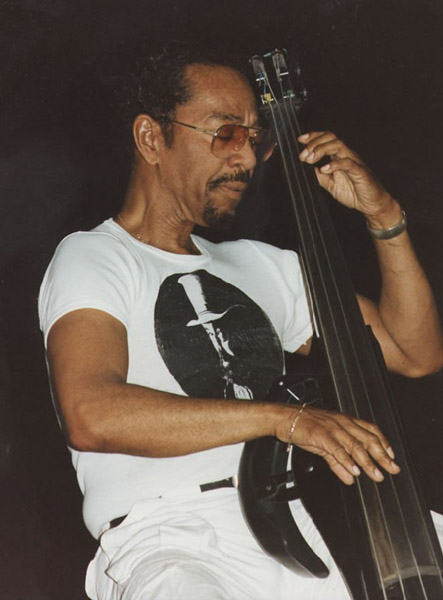
Paul Brown (Photo by Mike Williams)
2004 Unsung Hero Awards
Five Unsung Heroes (two of whom were brothers) were added to the New England Jazz Hall of Fame in 2004.
Stephanie Barber
Stephanie Barber: born Jan. 28, 1919 in Jamaica, NY, died: Aug. 26, 2003 in Pittsfield, MA
Stephanie Barber, who helped establish a home for jazz in the Berkshires in the 1950s and 1960s through the world-renowned Music Inn and The Lenox School of Jazz, became an “Unsung Hero” in September 2004 during a special NEJA presentation at the Tanglewood Jazz Festival. The faculty of the Lenox school included Dizzy Gillespie, Jimmy Giuffre, Max Roach, Bill Russo and Atilla Zoller. The fabled summer program ran 1957–1960.
Music Inn was the forerunner of many cultural phenomena, not the least of which was the outdoor jazz festival: its “Music Barn” even preceded Newport. The “house band” at Music Inn was the Modern Jazz Quartet, which would preview new music for the community. Along with its associated School of Jazz, Music Inn was a beacon of social and racial equality: even in the pre-Civil Rights era, there were no color lines.
In addition to an engaging sense of humor, one of Stephanie’s claims to fame was her keen ear. For example, a young dishwasher was accustomed to walking from his place of work to play Music Inn’s piano after-hours. Upon hearing him, Stephanie took him aside and urged him to pursue a career in jazz. He was tall enough to consider professional basketball, a career that clearly would have paid more, albeit for a shorter duration. He followed Stephanie’s advice, and today, fans of Randy Weston are still being rewarded by his decision. One of his most famous compositions, “Berkshire Blues,” is a tribute to Stephanie and Music Inn.
For further information about the Music Inn and the Lenox School, visit The Music Inn website.
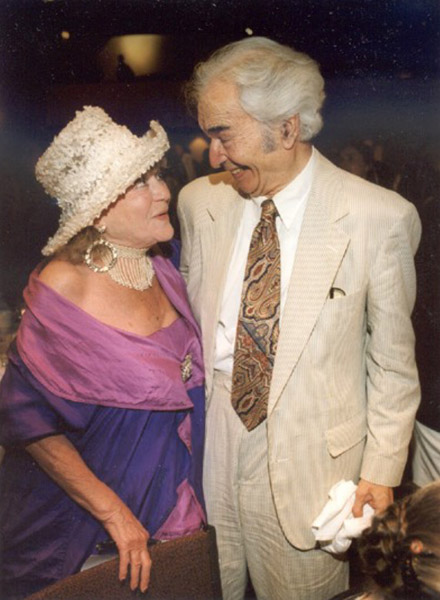
Stephanie Barber with Dave Brubeck, 1998 (Photo by John Seakwood)
Francis A. “Bobby” Buster and Eddie Buster
Francis A. “Bobby” Buster, 1928-93; Eddie Buster, 1932-99
Francis A. “Bobby” and Eddie Buster were named New England Jazz Alliance “Unsung Heroes” on May 8, 2004 during opening night of the NEJA Hall of Fame exhibit at Southern Connecticut University, New Haven. They were recognized for their selfless dedication to jazz as musicians, mentors and inspiration for the award-winning documentary film, “Unsung Heroes: the Music of Jazz in New Haven” after which NEJA’s award was named.
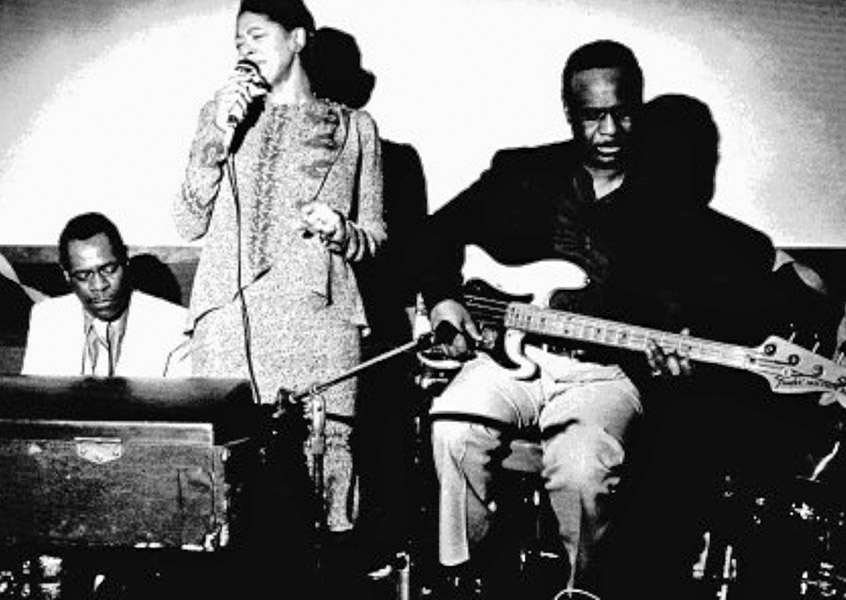
Eddie (left), Doris and Bobby Buster
on a club gig in New Haven
(Photo courtesy of Jackie Buster Lawrence)
Dorothy Prescott
Dorothy Ruth Cooke Prescott: born: Dec. 30, 1921 in Boston; died: Jan. 16, 1987 in Auburn, NH
Dorothy “Dot” Prescott acquired her love for jazz through the Hot Club of Boston and the Boston Jazz Society in the 1930s and 1940s. She was named an “Unsung Hero” on Oct. 25, 2004 during NEJA’s conference at the University of New Hampshire in Durham, where she established the New Hampshire Library of Traditional Jazz.
Toward the end of World War II, Dot Cooke fell in with a crowd who liked their music hot. This group of aficionados was the first Boston Jazz Society, later simply called the Jazz Society. Disc jockey Nat Hentoff was a member, as were photographer Bob Parent and all the musicians who comprised the Vinal Rhythm Kings. Another member of the Jazz Society was Sam Prescott, whom Dorothy later married. Together they amassed a trove of memorabilia and a record collection numbering in the thousands.
For about 18 months in 1944-46, the Jazz Society dedicated itself to sponsoring and promoting weekly concerts in Boston with the likes of Sidney Bechet, Wilbur DeParis, Edmond Hall and James P. Johnson. Eventually the group disbanded, but it was a exciting time for Dorothy and she never forgot it.
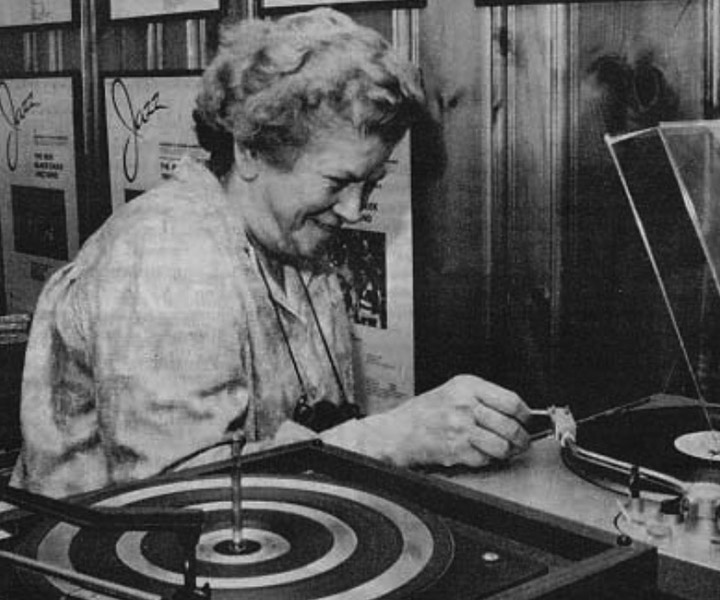
Dorothy Ruth Cooke Prescott
(Photo courtesy of New Hampshire Sunday News)
Dorothy founded the New Hampshire Library of Traditional Jazz at her home in Auburn, NH in 1978; it became the foundation of the library now housed at UNH. In 1979, she put her earlier work as a concert organizer to good use, establishing the Traditional Jazz Concert Series in cooperation with the UNH Department of Music. Through the generosity of her endowment, the annual series continues, and now spans the whole spectrum of mainstream jazz.
For more information about Dorothy and the library she founded, visit The Guide to the Dorothy Prescott Papers at the UNH Library of Traditional Jazz.
Vinnie Haynes
C. Vincent “Vinnie” Haynes: born: Aug. 31, 1921 in Boston; died: July 6, 2003 in Boston
It came as little surprise that hundreds of friends and admirers attended the services for Vinnie Haynes Thursday, July 10, 2003 at the Twelfth Baptist Church in Roxbury. Virtually thousands of Bostonians have benefited from Vinnie’s dedication to his many spheres of community interest—neighborhood planning and development, local journalism and history, sports and, of course, jazz.
Vinnie was Boston’s resident guru of jazz, one of the most knowledgeable and perhaps the hippest of those who observed, rather than played, the music. He was vice president of the Boston Jazz Society for three decades and was instrumental in helping the New England Jazz Alliance establish an authentic New England Jazz Hall of Fame as a member of the Hall of Fame nominations committee. Vinnie also was a major source for others conducting jazz projects, including Ken Burns, who used some of Vinnie’s photos in his 10-part public television series, Jazz.
Vinnie’s jazz photos, along with those of the late Bernie Moss and Florence Lewis, were featured in the “Keeping Jazz Alive” exhibition at the Cambridge Multicultural Arts Center in 2002. Vinnie was often called upon to lecture on the subject, and he was one of those interviewed on WGBH television’s award-winning documentary, Boston Jazz Memoir. But Vinnie’s expertise in jazz went beyond New England.
The Haynes brothers have certainly made their mark. There is Roy, the internationally famous drummer; Rev. Michael,the legendary pastor of Twelfth Baptist Church in Roxbury; and certainly not least, Vinnie, the renowned community activist who worked tirelessly to keep jazz alive.
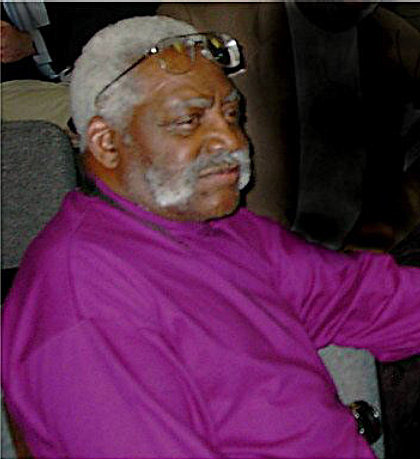
Vinnie Haynes (Photo by Brent Banulis)
